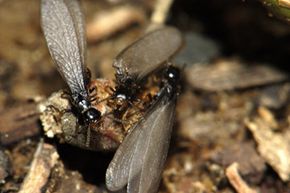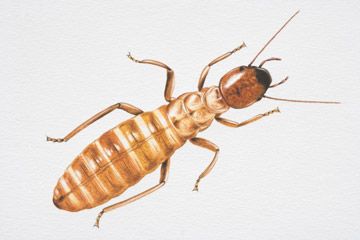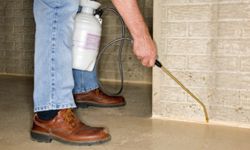Termites are pesky little insects that can cause a lot of damage to your home. They need food, moisture, and warmth to survive, and if they can find a way in, modern homes are often the perfect place for "silent destroyers" to dwell. The subterranean dwellers usually come into a home through its foundation, where the wood touches the moist soil where the termites live. The wood is a tempting, tasty, and plentiful food source for creatures that eat 24/7; in fact, it's estimated that termites cause $5 billion in damage each year [source: PestWorld.org].
A termite specialist can help you identify problem areas around your home that might make it attractive to termite colonies. Some possible trouble spots include areas where puddles form near the foundation cause by inadequate grading, or moisture run-off from air conditioning units.
Advertisement
Experts recommend Integrated Pest Management (IPM) to control many pests, including termites. This approach focuses on making structural changes to your home that will make it less attractive to invaders, as well as treatment if signs of activity are detected.
Several different termite treatment options are available, and the best choice depends on the home and the termite species. Termiticides, including liquids, baits, or a combination of the two are commonly used.
Termiticides provide a long-lasting barrier that prevents termites in the ground from entering the wood; termites already in the wood will die because they cannot return to the moist soil. Repellent and non-repellent (which kill termites) formulas are available, and both are effective.
Another treatment is baiting. Paper, cardboard or other attractive food, plus a slow-acting lethal substance is placed in a plastic cylinder and buried in the ground. Termites consume the bait, share it with their colony, and the number of termites in the area will gradually decline.
How do you know if termites are present in your home? Signs of termite activity include mud tubes and discarded wings from swarming mature termites, most often occurring in the spring. If you tap on wood and it sounds hollow, or push it and it caves in, you might have a problem. Many infestations have been discovered by accidentally bumping into baseboards with a dry cleaner attachment or broom.
When it comes to termites, an ounce of prevention is worth a pound of cure, so take a few simple steps to make your home less welcoming to termites:
- Eliminate moisture problems around your home that make the soil around it attractive
- Repair leaking faucets, water pipes and air conditioning units
- Maintain good drainage around the foundation – make sure there is no standing water
- Clean gutters and down-spouts
- Avoid excess mulch or ground cover near the foundation
- Seal entry points around water and utility pipes or lines
- Keep firewood, lumber, or paper away from foundation or crawl space
- Get rid of stumps and debris near house
- Inspect decks and wooden fences regularly for damage
- Prevent the wood on your home from contacting the soil
Homeowners are wise to continuously monitor and maintain their property to prevent termite damage. It's smart to schedule a regular inspection by a termite expert who can identify trouble spots as well as signs of activity.
Advertisement


